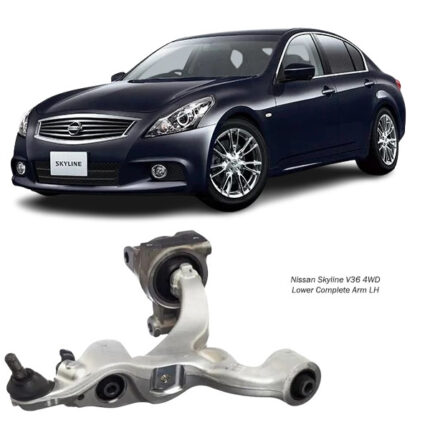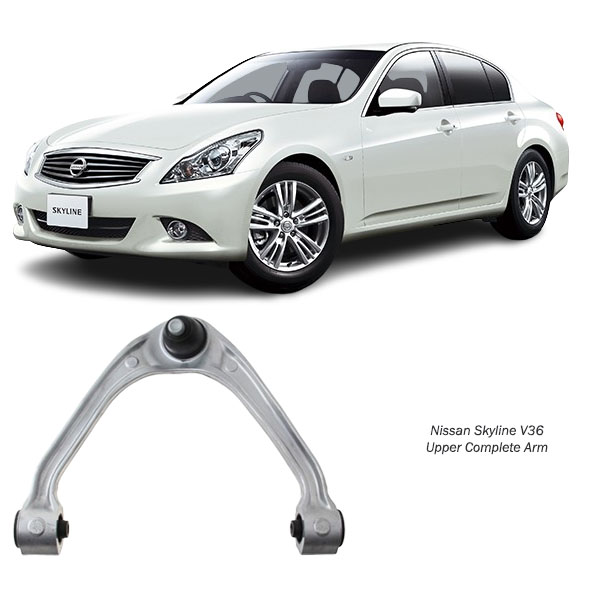-9%
Get Nissan Skyline V36 Upper Complete Arm 2WD/4WD 54524-JK000 in Kenya
The upper complete arm, or upper control arm, is a pivotal component of a vehicle’s suspension system, primarily found in double-wishbone or multi-link suspension setups. It plays a crucial role in maintaining the alignment of the wheels, ensuring stability, and providing a smooth driving experience. By connecting the vehicle’s chassis to the steering knuckle via a ball joint, the upper control arm facilitates controlled wheel movement while absorbing shocks from uneven road surfaces.
This article delves into the functions, components, benefits, maintenance tips, and common issues related to the upper complete arm.
Functions of the Upper Control Arm
- Wheel Alignment Stability
The upper control arm helps maintain the proper alignment of the wheels. It works alongside the lower control arm to manage the camber angle, which influences how the tires contact the road surface. Proper alignment enhances steering precision and reduces tire wear. - Facilitates Suspension Movement
Acting as a pivot point, the upper arm allows the suspension system to move vertically. This movement absorbs shocks from bumps and uneven terrain, ensuring a comfortable ride for passengers. - Supports Steering Dynamics
By connecting to the steering knuckle through a ball joint, the upper arm contributes to the vehicle’s steering geometry. It ensures that the wheels respond accurately to driver inputs while maintaining stability during turns. - Load Distribution
The upper control arm distributes the load from the vehicle’s weight and road impact between the chassis and the suspension system. This balanced load distribution prevents stress concentration on individual components.
Components of an Upper Complete Arm
- Control Arm Body
Typically made of steel, aluminum, or composite materials, the arm’s body provides structural strength while remaining lightweight to enhance suspension performance. - Ball Joint
The ball joint connects the upper arm to the steering knuckle, allowing multi-directional movement. It is crucial for smooth wheel articulation during driving and turning. - Bushings
Rubber or polyurethane bushings are installed at the arm’s connection points to the chassis. These bushings reduce vibrations, minimize noise, and allow for controlled arm movement. - Mounting Brackets
These secure the arm to the vehicle’s frame or subframe, ensuring it stays in position under dynamic loads.
Benefits of the Upper Control Arm
- Improved Ride Comfort
By facilitating smooth suspension movement, the upper arm minimizes the transfer of road shocks to the cabin, ensuring a more comfortable ride. - Enhanced Vehicle Stability
A properly functioning upper arm maintains wheel alignment and reduces body roll during cornering, improving overall stability. - Longevity of Tires
With the correct wheel alignment, the upper control arm prevents uneven tire wear, extending the lifespan of the tires. - Responsive Steering
The arm’s role in steering dynamics ensures precise and effortless control, especially during high-speed maneuvers or rough terrains. - Reduced Component Stress
By evenly distributing forces across the suspension system, the upper control arm prevents excessive wear on related components, such as the ball joints and bushings.
Maintenance Tips for the Upper Control Arm
- Regular Inspections
Check the arm and its components (bushings, ball joints) for wear, cracks, or rust during routine vehicle maintenance. - Lubrication of Ball Joints
Ensure the ball joint is adequately lubricated to prevent friction and extend its lifespan. Use high-quality grease recommended by the manufacturer. - Check Alignment
Periodic wheel alignment checks are crucial, as misalignment can strain the upper arm and related suspension components. - Replace Worn Bushings
If bushings show signs of wear, such as cracks or deformation, replace them promptly to avoid excessive vibration or noise. - Avoid Overloading
Carrying loads beyond the vehicle’s capacity can stress the suspension system, including the upper control arm, leading to premature wear.
Common Issues and Signs of Wear
- Worn Ball Joints
A damaged ball joint can cause clunking noises, uneven tire wear, and difficulty steering. Prompt replacement is necessary to maintain safety. - Bushing Deterioration
Over time, bushings can crack, shrink, or harden, leading to vibrations and reduced ride comfort. - Corrosion or Cracks
In areas with harsh weather or poor road conditions, the arm’s body may develop rust or cracks, compromising its structural integrity. - Misalignment
Symptoms of misalignment include uneven tire wear, pulling to one side while driving, and difficulty maintaining a straight path. - Vehicle Instability
Worn or damaged upper arms can cause excessive body roll, reduced cornering stability, and a bumpy ride.
Replacement and Repair
When to Replace the Upper Control Arm
- The arm is visibly bent or cracked.
- The ball joint or bushings are severely worn.
- Persistent alignment issues remain unresolved.
Replacement Process
- Lift the Vehicle: Use a jack and secure the vehicle on stands.
- Remove the Wheel: Gain access to the suspension components.
- Detach the Arm: Disconnect the arm from the chassis and steering knuckle by removing the bolts and ball joint.
- Install the New Arm: Secure the new arm in place, ensuring proper alignment.
- Reassemble and Test: Reinstall the wheel, lower the vehicle, and test for proper functionality.
Always consult the vehicle’s service manual or hire a professional for replacements.
Upgrading Upper Control Arms
Performance-oriented drivers or off-road enthusiasts often upgrade to aftermarket upper control arms for:
- Increased durability using high-strength materials like forged steel or aluminum.
- Adjustable settings for better alignment and handling.
- Enhanced articulation for off-road flexibility.
Conclusion
The upper complete arm is a vital component that significantly impacts a vehicle’s handling, comfort, and safety. By maintaining its condition through regular inspections, timely replacements, and proper use, you ensure optimal suspension performance and prolong the vehicle’s overall lifespan. Whether in city driving, highway cruising, or off-road adventures, a well-functioning upper control arm guarantees a smoother and more stable ride.
Follow us on Facebook for more parts.



